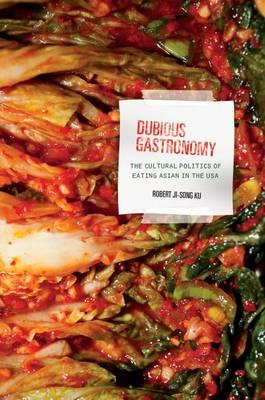Overview
By exploring the other side of what is prescriptively understood as proper Asian gastronomy, Robert Ji-Song Ku suggests that Asian cultural expressions occurring in places such as Los Angeles, Honolulu, New York City, and even Baton Rouge are no less critical to understanding the meaning of Asian food - and, by extension, Asian people - than culinary expressions that took place in Tokyo, Seoul, and Shanghai centuries ago. In critically considering the impure and hybridized with serious and oft en whimsical intent, Dubious Gastronomy argues that while the notion of cultural authenticity is troubled, troubling, and troublesome, the apocryphal is not necessarily a bad thing: The dubious can be and is oft en quite delicious.
Full Product Details
Author: Robert Ji-Song Ku
Publisher: University of Hawai'i Press
Imprint: University of Hawai'i Press
Dimensions:
Width: 15.20cm
, Height: 2.00cm
, Length: 22.60cm
Weight: 0.475kg
ISBN: 9780824839970
ISBN 10: 0824839978
Pages: 304
Publication Date: 31 December 2013
Audience:
General/trade
,
General
Format: Paperback
Publisher's Status: Active
Availability: Available To Order

We have confirmation that this item is in stock with the supplier. It will be ordered in for you and dispatched immediately.
Reviews
The six chapters, each dedicated to a particular food, reveal long, complex histories that not only involve the circulation, production, and consumption but also unearth stories of migration and exclusion, revealing much about the complexities of definitional power over authenticity and the construction of multiple boundaries of Asian, American, and, most important, Asian Americanness. In doing so, Ku grapples with the complex role of food in the making and unmaking of borders and systems of order including national order, systems of belonging, order of the body, family belonging through the passing down of culinary knowledge, hierarchies of taste and palatability, and the very ordering of what is acceptable for human consumption.-- <i>Journal of Asian American Studies</i>
The six chapters, each dedicated to a particular food, reveal long, complex histories that not only involve the circulation, production, and consumption but also unearth stories of migration and exclusion, revealing much about the complexities of definitional power over authenticity and the construction of multiple boundaries of Asian, American, and, most important, Asian Americanness. In doing so, Ku grapples with the complex role of food in the making and unmaking of borders and systems of order including national order, systems of belonging, order of the body, family belonging through the passing down of culinary knowledge, hierarchies of taste and palatability, and the very ordering of what is acceptable for human consumption.-- Journal of Asian American Studies
Ku's book does not seek to simply prove that certain foods are inauthentic, disreputable, or artificial; instead, he queries how these malleable discursive categories are used to limit and channel the consumption of Asian and Asian American ethnicity. . . . Ku is at his best when he shows how often contemporary culinary discussions of Asian authenticity rely on and reinforce an orientalist East-West binary. Ku's entry on dog meat, in particular, captures his trademark balance of sober research and challenging polemic. . . . Written in an accessible and entertaining voice, this book strikes a rhetorical balance, containing enough academic grist to push Asian American studies to further its critical engagement with the respective fields of food and postcolonial studies while providing a litany of anecdotes that would allow the book to sit comfortably on a coffee table next to Jennifer 8. Lee's best seller, The Fortune Cookie Chronicles.-- American Quarterly The six chapters, each dedicated to a particular food, reveal long, complex histories that not only involve the circulation, production, and consumption but also unearth stories of migration and exclusion, revealing much about the complexities of definitional power over authenticity and the construction of multiple boundaries of Asian, American, and, most important, Asian Americanness. In doing so, Ku grapples with the complex role of food in the making and unmaking of borders and systems of order including national order, systems of belonging, order of the body, family belonging through the passing down of culinary knowledge, hierarchies of taste and palatability, and the very ordering of what is acceptable for human consumption.-- Journal of Asian American Studies
The six chapters, each dedicated to a particular food, reveal long, complex histories that not only involve the circulation, production, and consumption but also unearth stories of migration and exclusion, revealing much about the complexities of definitional power over authenticity and the construction of multiple boundaries of Asian, American, and, most important, Asian Americanness. In doing so, Ku grapples with the complex role of food in the making and unmaking of borders and systems of order including national order, systems of belonging, order of the body, family belonging through the passing down of culinary knowledge, hierarchies of taste and palatability, and the very ordering of what is acceptable for human consumption.-- Journal of Asian American Studies Ku's book does not seek to simply prove that certain foods are inauthentic, disreputable, or artificial; instead, he queries how these malleable discursive categories are used to limit and channel the consumption of Asian and Asian American ethnicity. . . . Ku is at his best when he shows how often contemporary culinary discussions of Asian authenticity rely on and reinforce an orientalist East-West binary. Ku's entry on dog meat, in particular, captures his trademark balance of sober research and challenging polemic. . . . Written in an accessible and entertaining voice, this book strikes a rhetorical balance, containing enough academic grist to push Asian American studies to further its critical engagement with the respective fields of food and postcolonial studies while providing a litany of anecdotes that would allow the book to sit comfortably on a coffee table next to Jennifer 8. Lee's best seller, The Fortune Cookie Chronicles.-- American Quarterly
Author Information
Robert Ji-Song Ku is associate professor of Asian American studies at Binghamton University of the State University of New York, USA.




